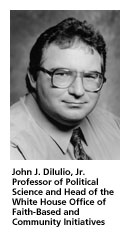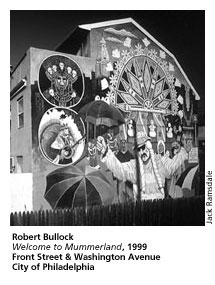
Holy Philadelphia
A Scholar of the City's Faith-Based Programs
Goes to Washington 
John DiIulio, C/G'80, was an altar boy and a student at St. Barnabas, a parochial elementary school in Southwest Philadelphia, where he grew up in a tightly knit blue-collar neighborhood. He hung out on corners with a bunch of kids, eating hoagies and playing whiffle ball, pinochle, and street hockey with squashed iced-tea cartons. "Dool," as his buddies called him, eventually earned a slot on the football team, along with a full scholarship, at a prestigious academy on Philadelphia's Main Line. "All of the Haverford kids were scared of me,"he remembers. "I never did fit in there."
Still, he went on to earn a doctorate at Harvard and tenure at Princeton by age 32, and then returned to Penn two years ago as the Frederic Fox Leadership Professor of Politics, Religion, and Civil Society. Says political science chair Jack Nagel, a former teacher of his, "There are so few people that have that combination of intellectual sophistication and street smarts." For the last decade, the outspoken scholar has been the object of overheated media attention, in part, he concedes, because he was a "hot-tempered Italian kid who didn't know how to do polite academic discourse." Now President Bush has tapped him to head the new Office of Faith-Based and Community Initiatives.
 The White
House program will help funnel government funds to religious groups that
provide social services--drug treatment, job training, literacy classes,
meals and shelter--to the needy. "When we see social needs in America,"
the president said, "my administration will look first to faith-based
programs and community groups, which have proven their power to save and
change lives." On leave for a year or two, DiIulio will guide the
new initiative in promoting charitable giving and volunteerism, understanding
how government money trickles down to the grassroots and with what results,
and identifying promising models of public-private cooperation.
The White
House program will help funnel government funds to religious groups that
provide social services--drug treatment, job training, literacy classes,
meals and shelter--to the needy. "When we see social needs in America,"
the president said, "my administration will look first to faith-based
programs and community groups, which have proven their power to save and
change lives." On leave for a year or two, DiIulio will guide the
new initiative in promoting charitable giving and volunteerism, understanding
how government money trickles down to the grassroots and with what results,
and identifying promising models of public-private cooperation.
Almost immediately, the White House came under attack for fostering an unholy alliance between God and Caesar. "A lot of people see this as one of the biggest violations of church-state separation that we've seen in American history," barked one critic who promised to wage holy war against it.
"We're not funding religion," DiIulio insists. The president's plan is to make it easier for religious and secular groups to get federal money and to encourage partnerships between public and private entities like the ones Philadelphia has pioneered.
"I think Philadelphia is a model city for everything," DiIulio asserts immodestly. "Some of the finest examples of community-serving ministry in the country, if not the world, that reach out to the poor…come from this city." Big Brothers/Big Sisters and the Pew Charitable Trusts are headquartered in Philly. Social work professor Ram Cnaan, who conducts research on Philadelphia with DiIulio for the Center for Research on Religion and Urban Civil Society, has estimated that the city's 2,000 religious congregations provide about $250 million in social services.
Although he is a practicing Catholic, DiIulio is also a social scientist and maintains that his "belief" in the power of religious ministries to respond to poverty has been "coerced by the data." He has studied closely the accomplishments of church-based organizations in Philadelphia's crumbling neighborhoods and has come to see them as the best hope of the inner city.
"It's about fact, not faith," the data-driven scholar reiterates. "I think one thing you can say about Philadelphians is…we have a pretty strong reality principle. We're kind of like the guy from Missouri: Show me. I think that--probably more than anything else--is the one thing that's kept me more or less sane in the last 15 years, and I think--I hope--it will keep me sane inside the Beltway."
 At
an on-campus press conference, he joked with those who found fault with
the White House initiative. "What you're really trying to ask is
whether the Mummers are going to get any money, because everybody knows
they are a religion." The Mummers are a Philadelphia tradition--local
clubs whose gaudy and raucous members parade through center city for a
New Year's Day competition.
At
an on-campus press conference, he joked with those who found fault with
the White House initiative. "What you're really trying to ask is
whether the Mummers are going to get any money, because everybody knows
they are a religion." The Mummers are a Philadelphia tradition--local
clubs whose gaudy and raucous members parade through center city for a
New Year's Day competition.
"I do hope the Bush administration doesn't mix in the fancies and the string bands," a reporter for the Philadelphia Daily News shot back.
"No comment," DiIulio smiled, demonstrating at last that he is not wholly Philadelphia.